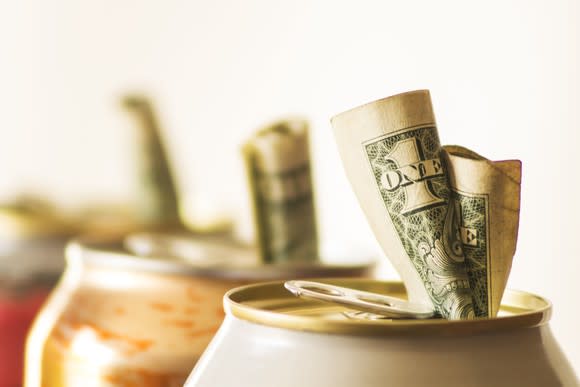3 Dividend Stocks That Pay You More Than Coca-Cola Does
Even newbie investors know that Coca-Cola is a dividend stalwart. The company has not only paid its shareholders but also increased the payout for 55 consecutive years. That leads to mind-boggling growth.
And today's yield of 3.3% from the company is high by historical standards. But cracks are starting to show in Coke's dividend. That's why you should check out the three dividend stocks recommended by our contributors: AT&T (NYSE: T), Kraft Heinz (NASDAQ: KHC), and Verizon (NYSE: VZ). They're all healthy and have higher yields than Coke is offering today.

Image source: Getty Images.
AT&T is a cheap, high-yielding gem for income investors
Jamal Carnette, CFA (AT&T): Increasingly, it appears as if the market is pricing in a dividend cut from Old Ma Bell. AT&T stock has dropped 20% year to date versus the 5% gain posted by the S&P 500. As a result, AT&T shares now yield nearly 6.5%, a figure three times higher than the greater index, while trading at nine times forward earnings, approximately half of the S&P's valuation.
The most recent letdown for the stock was a disappointing third-quarter earnings report, as investors myopically focused on DirecTV subscriber losses. This is understandable, as it was AT&T's plan for DirecTV to offset increased pricing pressures in the wireless telephony business.
However, lost in the report was the fact that AT&T beat revenue estimates and produced $6.5 billion in free cash flow (cash from operations minus capital expenditures), a 17% increase from last year's corresponding quarter and a figure more than adequate to service the $3.6 billion in quarterly dividend payments.
Management is guiding for full-year free cash flow of $21 billion, more than enough to service the $14 billion to $15 billion of dividends for the intermediate time frame. AT&T may not give much in the way of capital returns or significantly increase its payout in the foreseeable future, but it's likely to continue to service that massive dividend. Bargain-oriented income investors should put AT&T on their watchlists.
Who likes processed foods?
Nicholas Rossolillo (Kraft Heinz): Big food conglomerates have been under fire the last few years. As consumer tastes and preferences have changed, favoring healthier and fresher options, companies that specialize in processed foods have struggled to find any meaningful growth.
Even Warren Buffett favorite Kraft Heinz has been put in Wall Street's doghouse. Shares are down more than 40% from their high-water mark the last couple of years, as sales have gone stale and profits have headed in the wrong direction. There isn't a lot of silver lining at the moment; let's call it tin lining, like the kind you'd find in a Kraft snack food (like Planters Peanuts or Jell-O). Because of the stock's tumble, the dividend yield is at an attractive 4.5%, and the trailing one-year price-to-earnings ratio is a mere 6.1.

Oscar Meyer is owned by Kraft Heinz. Image source: Getty Images.
There's a reason for those depressed prices, though. Analysts expect profits to take more of a hit in the year ahead, implied by a one-year forward price-to-earnings ratio of 14.2. There are two ways to look at this: One is that the stock has plenty of downside left if the bottom line keeps sliding; the other is that investors have already priced some more pain in, and shares could begin to rebound if management can demonstrate it is gaining some positive traction.
I'm going to say the second scenario is likely. Though it wasn't perfect, organic sales (which exclude effects from brand acquisitions and sales) were up 2.6% year over year during the third quarter. The bottom line slightly missed again, but free cash flow (money left over after basic operations and capital expenditures are paid for) is at $555 million over the last 12 months and has been on the rise this year. That gives Kraft Heinz plenty of mobility to rearrange its food portfolio to capture changing consumer trends.
While investors wait for signs of life, there's always that dividend. And 4.5% is nothing to scoff at, especially while waiting on a food industry juggernaut like Kraft Heinz to turn things around.
Market beating? Maybe. Huge payout? Yes.
Brian Stoffel (Verizon): I'm not much of a dividend investor, but if I was, I'd team up with Jamal in calling out the other megaplayer in American telecom: Verizon. The company currently sports a payout of 4.3%.
To me, the sustainability of the payout is the most important thing. That means evaluating free cash flow (FCF). And on that front, Verizon is very strong. Over the first nine months of the year, FCF has almost tripled to $14.22 billion. And while the company has paid out $9.7 billion in dividends over the past year, that has only eaten up 44% of free cash flow. In plain English, this means the dividend is not only sustainable but has considerable room for growth over time.
I will admit to being disappointed that the decisions to acquire some Yahoo! properties and AOL have not panned out for Verizon. Luckily, the company's size has made such mistakes digestible. Its legacy business, on the other hand, is in great shape; it is the clear leader in the 5G space, and it has shown brisk subscriber gains.
But I want to caution investors: I don't own nor have I made an outperform call for Verizon in my own CAPS profile. That's because -- while I think Verizon makes an excellent choice for income investors looking for steady payouts -- I'm not convinced that returns will match that of the overall market.
That said, if all you're looking for is safety, Verizon's a pretty good bet.
More From The Motley Fool
Brian Stoffel has no position in any of the stocks mentioned. Jamal Carnette, CFA owns shares of AT&T. Nicholas Rossolillo owns shares of Coca-Cola and Verizon Communications. The Motley Fool recommends Verizon Communications. The Motley Fool has a disclosure policy.

 Yahoo Finance
Yahoo Finance 